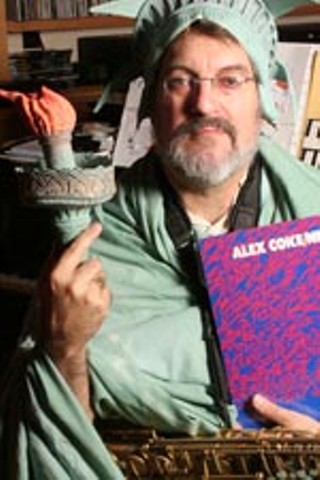Iraqnophobia
Alex Coke saxes political
By Jay Trachtenberg, Fri., July 22, 2005

This isn't exactly the typical venue – not the internationally renowned Bimhuis in Amsterdam, not fabled CBGB's in NYC, not even Austin's very own jazz basement, the Elephant Room, all locales that saxophonist Alex Coke has played recently. It's the entrance foyer of Central Market, just outside the produce section. Coke and three compadres are running through a set of not unfamiliar standards. A few feet away is a large display of newly imported New Zealand "Jazz" apples. Got it.
A few people stop to listen, but most are preoccupied with squeezing produce. A gig's a gig, right, even if it is for a corporate benefactor? Coke views it quite differently.
"It's important for music, and for jazz in particular, to be heard as part of the fabric of everyday life," explains Coke. "Austin's a place where you hear live music in the grocery store, in the bookstore, at the airport, in addition to all the nightlife. Live music is pervasive here and it makes musicians feel connected to their community. That doesn't happen in most other cities. It also provides musicians with a livelihood."
Coke's livelihood is music and he supports himself and his family of four as a working jazz musician. It's not an easy endeavor given that jazz can hardly be viewed as mainstream music, but the unpretentious, easy-going, Dallas native has managed since first settling in Austin in 1977 after graduating from the University of Colorado.
"It's a lot harder to live here now because of the real estate prices," he laughs. "When rent was $45 a month, it was easy to do three $15 gigs."
He's flourished, in part, due to his musical flexibility. You might catch the saxist with singer-songwriter Michael Shay at Ruta Maya, blowing alongside hillbilly rocker Jon Emery at Jovita's, accompanying a local supper-time pianist at Truluck's, helping provide a musical soundtrack for the silent film Nanook of the North at the Alamo Drafthouse, or playing a straight jazz gig in a church.
Over the years, Coke has developed strong ties to the local community. Close relationships with vocalist/bandleader Tina Marsh, of whose Creative Opportunity Orchestra (CO2) Coke is a founding member, and pianist Rich Harney, have provided a wellspring of creativity.
"It takes lots of effort to get the music out," says Marsh, "so you come to depend on one another to create more than what's simply on the page. It involves an incredible level of trust that grows over time, like a filial bond."
Coke also sees it as a safety net.
"We look out and cover for each other so we can take musical chances."
That extends to a professional safety net in terms of hiring one another for gigs. When it comes to forging ties to the community, Coke is particularly proud of his participation last season in the Austin Jazz Workshop, founded by fellow musician Mike Mellinger as a means of getting live jazz into public schools.
"Even with the unlikely chance they get to hear jazz at home, they probably perceive it as old people's music," theorizes Coke, "but in school, being created right in front of them, it's alive!"
The program content changes annually, and this year, Coke was on hand as a Tough Texas Tenor, a reference to the swaggering, bluesy saxophone tradition that developed in the Lone Star State.
"I was born in Texas and I play the tenor so I guess that qualifies," he says with a smile, "but it takes a long time to get a sound."
Doing the workshops every day reminded Coke of his formative years in Dallas, seeking out tenor forebears like David "Fathead" Newman, Marcel Ivery, and James Clay. ("Records were available by these guys, but it was basically still an oral tradition.") His musical education continued outside Texas later when he and his wife, Mary Yznaga, spent the early Eighties in Washington, D.C., for her work with NPR. After a slight return to Austin, the couple followed a gig to the Canary Islands that eventually deposited them in Paris and Spain for two years. Returning to Austin, Coke's work was so prolific and inspiring that he was named Austin's Jazz Musician of the Decade by the Austin American-Statesman.
Coke's big break came in 1992 when he landed a job with the internationally renowned Willem Breuker Kollektief and moved to Amsterdam for eight years. He globe-trotted in service of a jazz spectrum of performances, from far-flung international jazz festivals to Esther's Follies on Sixth Street. Playing in Bosnia during the war remains a particularly vivid experience.
"We were escorted to the gig in armored vehicles with helicopters overhead," relays Coke. "During one of my solos, I walked down into the audience and around the auditorium to get closer to the people. The soldiers didn't know what to do, they were stunned."
The saxophonist is grateful for his tenure in the WBK.
"I don't miss the road, but I miss playing night after night. I loved Amsterdam and the scene, and one of the reasons why was because they were a family. When I got back to Austin, I realized we have that here with CO2, and with me and Rich [Harney]. It's a very special thing."
Coke's latest and most ambitious project to date, Iraqnophobia, features Tina Marsh and CO2 and is influenced by his years with the Kollektief. The first part of the album, "Wake Up Dead Man," a musical commentary on Texas prison life, was composed before the Breuker years. The suite features the hallmarks of WBK nonetheless.
"It's through composed," explains Coke. "It's one long piece and almost everyone gets to solo, rather than different tunes with several soloists on each. Willem, like Duke Ellington, is fond of writing for individual players."
The piece was born after Coke returned from a Midwest tour that coincided with 9/11 and found club owners and patrons demonstrating effusive gratitude for music to offset the shell shock. "Those gigs became vigils with people bringing flowers and candles to the shows," according to Coke. "Like what I was saying about music being part of the community, and in this instance, a very important part; people needed it and so did we."
Later came the album's moniker, Iraqnophobia.
"That's a weird title," Coke muses thoughtfully, "it sounds political. A good piece of music should evoke different feelings in different people. I didn't want it to have a political agenda as much as I wanted to raise the question and make people think. If wanting world peace is political then, yeah, it's political. And, I guess, with the current state of our country, the word 'Iraq' in the title makes it incredibly political. But it's more to make people think."
Coke plays a thinking person's music and usually projects the aura of an eternal optimist. He relates an experience from several months ago when he and Tina Marsh were playing at the Bimhuis with New Texas Swing, an ongoing project that reinterprets traditional Texas folk songs into avant jazz explorations. At the break, an elderly gentleman came up to Coke.
He said, "'I grew up on Louis Armstrong and Sidney Bechet and I saw them perform. That's really my music. But I like what you're doing because I know where it comes from.'"
Coke is quick with his own wry comeback.
"Nowadays most people have no idea where we're coming from."
Perhaps one day jazz and the knowledge of its origins will be as common as apples. ![]()







